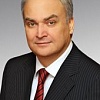Moscow's envoy in Washington has warned that a growing backlash against all things Russia-related in the United States in response to the war in Ukraine has surpassed even Cold War-era levels, telling Newsweek that not only diplomatic ties but also cultural, educational and scientific were under unprecedented strain.
"The United States has been swamped by a wave of Russophobia fuelled by the media at the instigation of the ruling circles," Russia's ambassador to the U.S., Anatoly Antonov told Newsweek. "The situation has taken the worst forms of the anti-communist paranoia and witch-hunt of the McCarthy era."
Moscow's envoy in Washington has warned that a growing backlash against all things Russia-related in the United States in response to the war in Ukraine has surpassed even Cold War-era levels, telling Newsweek that not only diplomatic ties but also cultural, educational and scientific were under unprecedented strain.
"The United States has been swamped by a wave of Russophobia fuelled by the media at the instigation of the ruling circles," Russia's ambassador to the U.S., Anatoly Antonov told Newsweek. "The situation has taken the worst forms of the anti-communist paranoia and witch-hunt of the McCarthy era."
He argued that the present state of affairs has sunken below even that of the infamous "red scare" led by late Senator Joseph McCarthy in the aftermath of World War II, as he stated that the scope of targets was now broader.
"Even during the Cold War, our nations continued cultural, educational and scientific contacts," Antonov said. "I just hope that common sense will prevail and help end the dangerous game of canceling Russia, bordering on the ideas of racial superiority."
President Joe Biden has rolled out successive sets of sanctions in response to what his Russian counterpart Vladimir Putin has referred to as a "special military operation" launched against Ukraine on February 24. The White House accused the Kremlin of "war crimes" and even "genocide" committed against the Ukrainian people as the conflict rages on, and has continued to expand these restrictions to include both state and non-state institutions in Russia.
But in the U.S. itself, where a Pew Research Center poll published Tuesday showed some three quarters are in support of strict sanctions against Russia, a parallel phenomenon has taken place in the civilian sector in which events have been canceled, cooperation cut and businesses boycotted as a result of their connections to Russia.
Antonov said it all had a geopolitical element.
"The unprecedentedly wide-spreading campaign to cancel everything Russian is accompanied by baseless and sweeping accusations against our country aimed at creating an image of Russia as an outcast," the senior Russian diplomat said.
Pointing to some recent examples, he said that "anti-Russian hysteria has quickly spread to everyday life."
Among the more high-profile incidents has been the decision by a number of major musical institutions to drop performances by Russian conductor Valery Gergiev and pianist Denis Matsuev, both prominent supporters of Putin, shortly after the conflict in Ukraine erupted. In some cases, even classical songs have been removed from the bill, including the works of 19th-century composer Pyotr Tchaikovsky, renowned for ballets such as "Swan Lake," "The Nutcracker" and the "1812 Overture."
Also on the chopping block have been longstanding associations between professionals in the U.S. and Russia. The Educational Commission for Foreign Medical Graduates has suspended certification for Russian citizens and the oncology group OncoAlert has severed ties with Russian doctors, both actions taken in displays of solidarity with Ukraine.
And with U.S.-Russia space collaboration, a hallmark of the detente that put an end to the Cold War-era space race, now at a standstill, the Space Foundation's annual "Yuri's Night," named after Soviet cosmonaut Yuri Gagarin, the first human to travel into outer space, has been rebranded as "Celebration of Space."
The moves have prompted some controversy among artists and professionals, who have called for measures to focus more specifically on those explicitly backing Putin and Russia's war effort in Ukraine.
Antonov sardonically quipped that "the anti-Russian madness might soon as well require the patriotic song 'God Bless America' written by Irving Berlin, a native of Russia, to be erased from the American history."
"For that matter," he added, "maybe the U.S. authorities should abandon the use of all inventions made in various years by immigrants from Russia, starting from color television, created by Vladimir Zworykin, to helicopters designed by Igor Sikorsky."
Sikorsky was born in Kyiv, then ruled by the Russian Empire, and began his eponymous aircraft company in the U.S., but remained proud of his Russian roots, expressing views throughout his life that were in line with Russian nationalism. Sikorsky Aircraft was sold to U.S. defense conglomerate Lockheed Martin in 2015, but aircraft developed by the company still bear his name, including those in service with the U.S. military.
Source: Newsweek




